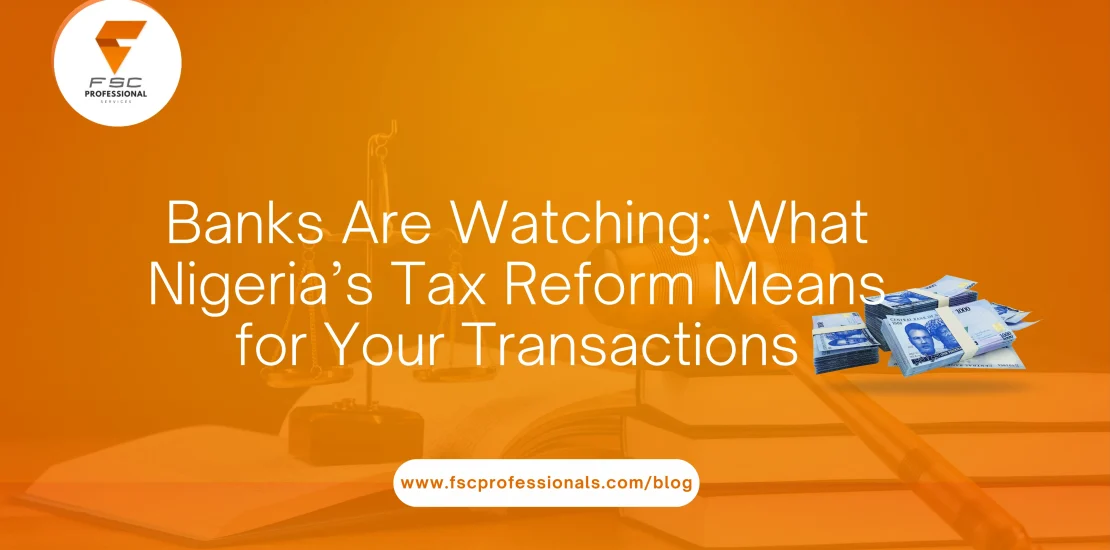- July 24, 2025
- Posted by: admin
- Category: Tax

With the Nigerian Tax Administration Act 2025, the Federal Inland Revenue Service (FIRS), which will change to Nigeria Revenue Service (NRS) in January 2026, is upping its game, and your bank is now part of the surveillance.
Under Section 29 of this newly signed Act, banks, insurance companies, stockbrokers, and other financial institutions are now legally required to report their financial transactions to the FIRS every quarter, once they exceed specific thresholds.
This marks a new era in tax administration, one that demands complete transparency, financial discipline, and compliance by default.
What Does Section 29 Really Say?
According to Section 29 of the Nigerian Tax Administration Act 2025:
-
Individuals who move over ₦25 million in any single month
-
Companies that move over ₦100 million monthly
…are automatically subject to mandatory financial reporting by their bank or financial institution to the FIRS every quarter.
This is no longer about whether you’re audited.
The system will now tell the tax authorities where to look, when to look, and how much to investigate, even before you file anything.
Why This Matters More Than You Think
If you’re a business owner, entrepreneur, or high-net-worth individual, this should trigger immediate internal conversations.
Why?
Because the system is already watching. And it’s watching at scale.
The beauty (and danger) of Section 29 lies in its automation. You won’t receive a warning. There’s no notification. Your bank is simply required to hand over the data once thresholds are crossed. Think of it as compliance without consent.
Here’s how it plays out:
-
You or your business exceeds the monthly transaction limit
-
Your bank flags it internally and submits a report to the NRS
-
The NRS matches your reported turnover with your tax filings
-
If there’s a mismatch, you’re flagged, and likely penalised
Who Is Affected?
-
Small businesses that have grown quickly but haven’t adjusted their tax strategy
-
Startups receiving large capital inflows or seed funding
-
E-commerce operators, freelancers, and digital service providers with high-volume payments
-
Investors and traders in cryptocurrency or stocks
-
NGOs or religious bodies with significant cash inflows (which, although exempt, are still being watched)
What You Should Do Right Now
Let’s be clear: this law isn’t meant to punish. It’s meant to bring discipline to the tax system. If your numbers are clean and compliant, you have nothing to fear. But if you’ve been cutting corners, now is the time to fix it.
Here’s how to get started:
1. Reconcile Turnover vs Tax Reporting
Make sure your monthly bank inflows match what your tax filings reflect. Any significant gaps could raise red flags.
2. Clean Up Historical Records
Do a backward audit of your last 12-24 months. Were there months where your business crossed ₦100 million, but your returns didn’t match?
3. Engage a Tax Advisor
Now is not the time for guesswork. A professional tax advisor (like FSC Professionals) can help you:
-
Perform a risk assessment
-
Identify inconsistencies
-
File amended returns where necessary
-
Set up proper accounting systems
4. Educate Your Team
Make sure your finance, compliance, and operations teams know what this law means. You can’t afford ignorance in 2025.
FSC’s Expert Take: This Is the Age of “Smart Surveillance”
Section 29 is proof that Nigeria’s tax system is going digital , not just with automation tools like TaxPro Max, but with real-time financial visibility.
Gone are the days when tax authorities waited for you to file. Now, they know what you should be filing before you even do it.
And with reforms like:
-
Electronic Fiscalisation Systems (EFS)
-
Transition from FIRS to Nigeria Revenue Service (NRS)
-
Expanded digital tax provisions for crypto and tech businesses
…it’s clear that the government is building a tax ecosystem that runs on data, not declarations.
Final Word: Don’t Get Caught Off Guard
Banks on kick off of the law in January 2026, are now active agents of tax enforcement. They don’t need to ask for your permission, they’re mandated by law.
And with a simple quarterly data dump, your financial life becomes open to scrutiny.
So instead of hiding or hoping, the best approach is to prepare.
- Reconcile your books
- File your returns accurately
- Ask for help if you’re unsure
At FSC Professional Services, we help individuals and businesses like yours stay compliant, stay protected, and stay ahead.
